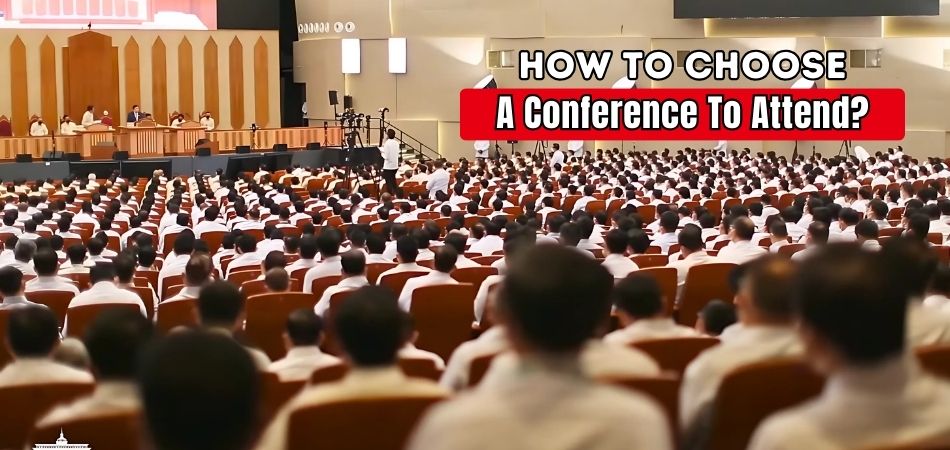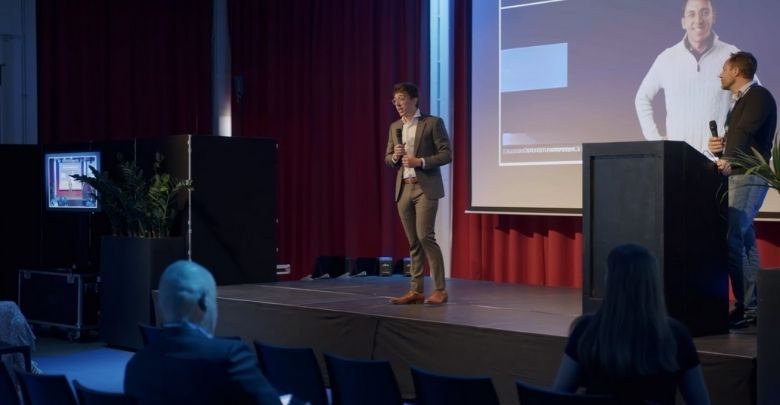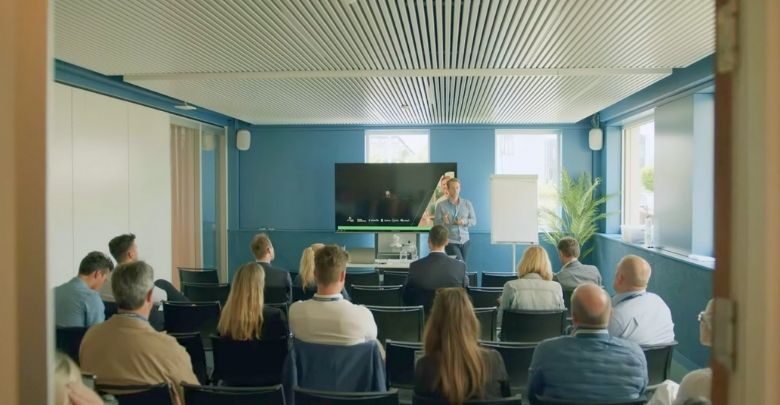Conferences can be a great source of opportunities, bringing together industry experts, innovators, and like-minded professionals. They’re the perfect setting for inspiration, networking, and skill-building. But with so many options out there, it can be confusing to figure out how to choose a conference to attend.
To make the best decision, start by defining your personal and professional goals. Consider what you want to learn, who you’d like to connect with, and how the event aligns with your career aspirations. This clarity will guide you in selecting a conference that truly benefits you.
Ready to dive deeper? Join us as we explore practical tips and strategies to help you explore the world of conferences and make an informed choice that suits your needs.
Why Attending Conferences Matters for Your Growth?
Attending conferences is more than just a break from your routine; it’s a powerful opportunity for personal and professional growth. The benefits of participating in these events can significantly impact your career path. Here are a few compelling reasons why attending conferences matters for your growth.
- Networking Opportunities: Conferences gather professionals from diverse backgrounds. This setting encourages meaningful connections that can lead to potential collaborations, mentorships, and job opportunities.
- Access to Industry Insights: Attending conferences allows you to stay updated on the latest trends and developments in your field. Expert speakers share valuable knowledge that can help you stay ahead of the curve, especially with the upcoming conferences in USA offering fresh perspectives.
- Skill Development: Many conferences offer workshops and hands-on sessions. Participating in these can enhance your skill set, making you more competitive in the job market.
- Inspiration and Motivation: Engaging with passionate speakers and attendees can reignite your enthusiasm for your work. Conferences often provide the spark needed to fuel your creativity and drive.
- Exposure to New Ideas: Conferences encourage the exchange of innovative ideas. This exposure can challenge your thinking and inspire new approaches to your projects.
- Building Your Personal Brand: By attending and participating in discussions, you strengthen your visibility in the industry. This helps in establishing yourself as a knowledgeable and engaged professional.
Overall, conferences are a valuable investment in your future, providing numerous avenues for growth and success.
How to Choose a Conference to Attend: Factors to Consider
Choosing the right conference can be a daunting task, especially with so many options available. Being aware of the factors that play
a crucial role in this decision-making process can simplify your choice and ensure you get the most out of your experience. Here are some essential factors to consider when figuring out how to choose a conference to attend.
Define Your Goals
Identify what you hope to achieve by attending the conference. Are you looking to learn specific skills, network with industry professionals, or gain insights into market trends? Knowing your goals will help you focus on events that align with your objectives.
Research Conference Themes and Topics
Study the event’s agenda to see if the themes and topics align with your interests or career needs. Look for conferences that cover relevant subjects and offer sessions that can add value to your professional development.
Review the Speakers
High-profile speakers can be a major draw, but ensure they are relevant to your field. Research their background, expertise, and the topics they will discuss to determine if they can provide the knowledge you’re seeking.
Consider the Location and Accessibility
The location of the conference plays a significant role. Choose an event that is either within your travel budget or located in a place you’re willing to visit. Accessibility can also mean considering the time and resources needed to attend, especially when selecting conferences to attend that fit your schedule.
Check the Event Format (Virtual or In-Person)
Virtual conferences are cost-effective and convenient, while in-person events offer better networking opportunities. Decide which format suits your needs and is compatible with your schedule and learning preferences.
Budgeting for the Conference
Factor in all expenses, including registration fees, travel, accommodation, and other costs. Some conferences offer early bird rates or group discounts, so keep an eye out for these deals to save money.
Networking Opportunities
Assess whether the conference offers good networking chances. Check if there are organized meetups, round-table discussions, or breaks where you can connect with other professionals. Building a network is one of the key benefits of attending a conference.
Explore Additional Benefits and Resources
Some conferences provide additional benefits like access to recorded sessions, workshop materials, or certification opportunities. These resources can be valuable long after the event is over, so consider their availability in your decision-making process.
Review Feedback from Past Attendees
Look for testimonials or reviews from people who have attended the conference in previous years. This feedback can give you insights into the event’s quality, organization, and whether it was worth the investment for past participants.
Ultimately, choosing the right conference is about aligning your personal and professional goals with the event’s offerings. By considering these factors, you can make an informed decision that will increase your knowledge and expand your network, ensuring a rewarding experience.
Virtual vs. In-Person Events: Which Conference Is Right for You?
When it comes to attending conferences, the choice between virtual and in-person events can feel overwhelming. Each format has its unique advantages, and your decision should align with your personal preferences and professional goals. Here are the key points to help you choose which conference is right for you.
Convenience
Virtual events allow you to participate from the comfort of your home or office, eliminating travel time and costs. This convenience means you can fit learning into your schedule more easily, especially if you have other commitments.
Cost-Effectiveness
Attending a virtual conference typically comes at a lower price than in-person events. You save on expenses like flights, hotels, and meals, making it a budget-friendly option for many professionals.
Networking Opportunities
In-person conferences often provide richer networking experiences. The chance to engage face-to-face allows for deeper connections, spontaneous conversations, and a more vibrant atmosphere to meet fellow attendees. Additionally, getting invited to conferences often comes with greater opportunities to network with industry leaders.
Interactive Experiences
Many in-person events feature workshops, breakout sessions, and hands-on activities that increase engagement. These interactive formats can enhance learning, making the experience more memorable and impactful.
Access to Content
Virtual conferences often offer recorded sessions, allowing you to revisit important talks later. This flexibility ensures you don’t miss valuable information, making it easier to absorb and apply what you’ve learned.
Comfort Levels
Consider your comfort with technology and social settings. If you rely on direct interactions and face-to-face discussions, in-person events may suit you better. Conversely, if you prefer a more controlled environment, virtual events could be ideal.
Ultimately, both formats offer valuable opportunities. By weighing these factors, you can choose the conference that best meets your needs.
How to Review the Speakers and Sessions at a Conference?
Reviewing the speakers and sessions at a conference is essential to ensure you’re investing your time wisely. The right lineup can enhance your experience and provide valuable insights. Here are some of the effective ways to assess the speakers and sessions.
Research the Speakers’ Backgrounds
Start by looking into each speaker’s qualifications and experience. A quick online search can reveal their professional journey, areas of expertise, and past speaking engagements. This insight will help you gauge their credibility and relevance to your interests.
Examine Session Descriptions
Read the descriptions of each session carefully. They should outline the topics covered and the expected outcomes. Look for sessions that not only interest you but also promise actionable takeaways that you can apply in your work.
Check for Interactivity
Sessions that encourage audience participation can be more engaging. Look for workshops, panel discussions, or Q&A segments that allow you to interact with the speakers. This creates a richer learning experience and creates networking opportunities.
Seek Recommendations and Reviews
Before the conference, check for feedback from previous attendees about the speakers and sessions. Online forums, social media, or even the conference’s own website may have testimonials that offer insights into the quality and effectiveness of past events.
Look for Diversity in Perspectives
A well-rounded conference should feature speakers from various backgrounds and industries. This diversity can provide a broader range of ideas and viewpoints, enriching your learning experience and helping you think outside the box.
By taking these steps, you can ensure that you’re choosing sessions that are informative and engaging, making your conference experience truly worthwhile.
What to Look for in Conference Reviews and Feedback?
When choosing a conference to attend, reviews and feedback can be your best friends. They provide valuable insights into the experience of past attendees, helping you gauge whether the event lives up to its promises. Here’s what to look for when sifting through conference reviews and feedback.
Content Quality
Focus on comments regarding the session topics and speaker effectiveness. Are attendees finding the content relevant and engaging? Look for mentions of actionable takeaways and whether the sessions sparked meaningful discussions.
Speaker Expertise
Pay attention to reviews that highlight the speakers’ backgrounds. Were they knowledgeable and engaging? Feedback on their presentations can reveal how much value you might gain from their insights and experiences.
Networking Opportunities
Check for comments about networking experiences. Did attendees make valuable connections? Look for mentions of organized events or informal meetups that encourage networking, as these can significantly improve your conference experience.
Event Organization
Well-organized conferences often receive praise for smooth logistics. Look for feedback about the registration process, session scheduling, and overall event flow. Positive remarks in this area can indicate a professional and enjoyable atmosphere.
Overall Experience
Finally, consider the general sentiment expressed in the reviews. Are most attendees satisfied with their experience? Look for recurring themes in the feedback that can guide you in deciding if the event is worth your time and investment.
By carefully analyzing these aspects in conference reviews, you’ll gain a clearer picture of what to expect. This knowledge will empower you to make a more informed decision about which conference is right for you.
Practical Tips for Making the Most of Your Conference Experience
Making the most of your conference experience can significantly enhance your learning and networking opportunities. With a bit of planning and a proactive approach, you can turn your attendance into a fruitful experience. The following practical tips will help you maximize your time at the conference.
Set Clear Goals
Before attending, define what you hope to achieve. Whether it’s learning about new trends or connecting with industry leaders, having clear goals will guide your activities throughout the event.
Plan Your Schedule
Review the agenda in advance and identify the sessions that interest you most. This helps ensure you don’t miss key presentations and can manage your time effectively between different events.
Engage Actively
Don’t be a passive attendee. Ask questions during sessions, participate in discussions, and take notes. Engaging with speakers and fellow attendees enhances your learning experience and fosters valuable connections.
Network Strategically
Approach networking with intention. Identify key individuals you want to meet, and don’t hesitate to introduce yourself. Utilize breaks or social events to foster relationships that could benefit your career.
Follow Up
After the conference, reach out to the people you connected with. Send a quick email or connect on LinkedIn. This simple gesture can help solidify the relationships you’ve built and open doors for future opportunities.
Reflect and Implement
Once you return home, take time to reflect on what you learned. Identify key takeaways and think about how to apply them in your work or projects. This will ensure that the knowledge gained continues to impact your career positively.
By following these tips, you can transform your conference experience into a valuable investment in your professional journey.
Frequently Asked Questions
When deciding how to choose a conference to attend, many people have questions about the best practices for making this choice. Here are some common questions that come up, along with answers that can help guide your decision-making process.
Is it Better to Attend Large Conferences or Small Ones?
Both have benefits! Large conferences offer extensive networking opportunities and diverse sessions, while small events allow for deeper connections and more personalized interactions. Choose based on your goals and the kind of experience you’re seeking.
Should I Attend Conferences in My Industry Only?
Not necessarily. While industry-specific events are great for specialized knowledge, attending conferences in related fields can provide fresh perspectives and innovative ideas that may be valuable to your career or business growth.
Do Virtual Conferences Offer the Same Value as in-Person Ones?
Virtual conferences are cost-effective and convenient but may lack the same networking vibe as in-person events. However, they still offer valuable learning opportunities and allow you to connect with experts from around the world without the need for travel.
How Far in Advance Should I Plan for a Conference?
Ideally, start planning at least three to six months ahead. This allows you to secure early bird tickets, prepare your schedule, and arrange travel and accommodation if needed, ensuring a smooth and stress-free conference experience.
Is it Worth Attending a Conference Alone?
Absolutely! Attending alone encourages you to step out of your comfort zone, meet new people, and fully immerse yourself in the experience. Solo attendance can lead to meaningful connections and a more focused approach to achieving your goals.
Last Words
Choosing the right conference can be a turning point in your career or business journey. Knowing how to choose a conference to attend ensures that you invest your time, money, and energy in the right place, maximizing your growth and learning opportunities.
Remember, it’s all about aligning the event with your personal goals, reviewing its content, and seizing networking moments. When you choose wisely, each conference becomes a stepping stone toward your professional success and inspiration.
Ready to make your decision? Use the tips shared here on how to choose a conference to attend, and turn your next event into a powerful experience that adds real value to your journey. Your best conference is just one thoughtful choice away.








